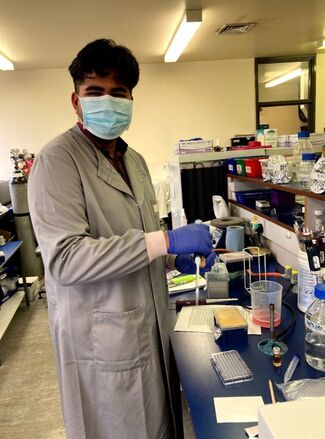
Background The word “Evolution” is something which I have always been fascinated about. I completed my B.Sc. degree in Zoology in 2019 from Cotton University, India. During my undergraduate degree, I worked on Drosophila melanogaster and studied their behavioural characteristics in response to different environmental selection pressures. This research experience intensified my enthusiasm to understand the key factors that drive evolution in both macro- and micro-organisms. I then completed a M.Sc. degree in Microbiology from Amity University in 2021. As part of my Master’s research project, I worked on the characterization of the molecular and morphological markers of mosquitoes of the Culex vishnui subgroup that act as major vectors for the transmission of Japanese encephalitis. The study was conducted at RMRC-ICMR, Northeast Region, India. This is when I developed my special interest in public health. My interest in evolution and the emerging public health concern of Antimicrobial Resistance made me join the M.Sc. Antimicrobial Resistance program at the University of Sheffield. I believe this course will be a stepping-stone towards my research objective of demystifying the underlying molecular mechanisms of evolving resistant strains of pathogenic microorganisms. After completing this course, I aim to do a PhD focusing on developing Antimicrobial agents. Florey MSc Research Project Action of targeted antifungal polymers against Candida albicans My research project involves investigating the antifungal activity of a relatively novel reformulation of Amphotericin-B, conjugated with smart polymers, against the fungal pathogen Candida albicans, supervised by Dr Joey Shepherd (/sheffield.ac.uk/shepherd-lab/home). Candida albicans often cause life-threatening infections in immunocompromised hosts, and the continuous rise in antifungal resistance is creating more difficulties in treating C. albicans associated infections. The smart polymers we are researching on are thermoresponsive that undergo conformational changes at specific temperatures. Earlier functionalization studies with this polymer revealed the interesting nature of its polymer-biology interactions. The microbiological techniques I am using encompasses various antifungal susceptibility testing, biofilm quantification assays, fluorescence microscopy as well as cytotoxicity studies on human dermal fibroblast cell lines to test the potential application of this conjugated polymer as an alternative to the highly cytotoxic Amphotericin-B. It has been an amazing experience with the intense research exposure I have gained while working on the project alongside the wonderful Lab members. This experience will be valuable for my future aspirations of becoming a researcher and contributing to tackling the emerging public health issue of antimicrobial resistance. |
The Team
|
